|
|
|
Sort Order |
|
|
|
Items / Page
|
|
|
|
|
|
|
| Srl | Item |
| 1 |
ID:
176862
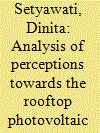

|
|
|
|
|
| Summary/Abstract |
In 2018, the Indonesian government issued the Rooftop Photovoltaic Solar Systems (RPVSS) policy that allows customers of the State Electricity Company (PLN) to generate their own electricity supply from solar photovoltaic (PV) systems and export surplus electricity to the national grid, valued at 65% of the full retail tariff. This policy is an effort to increase renewable energy levels in the national energy mix by 23% by 2025. Customer adoption of PV systems relies on the perceptions and perceived benefits of the technology, as well as general issues of confidence in the product. This paper explores the public's acceptance of the RPVSS policy from multiple perspectives. An online survey of PLN customers (n = 987) indicated consumer issues in adopting PV systems, such as high capital costs, long term return on investment and lack of information, as well as institutional issues such as the limited role of PLN and the absence of government financing mechanisms. Additional interviews with the government, private sector and energy experts identify the export rate for electricity injected into the grid as the main barrier to attracting prospective users. This paper's findings provide useful recommendations for policymakers to successfully implement the policy and increase solar energy deployment.
|
|
|
|
|
|
|
|
|
|
|
|
|
|
|
|
| 2 |
ID:
115718
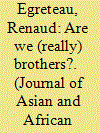

|
|
|
|
|
| Publication |
2012.
|
| Summary/Abstract |
This article considers the views that Chinese diplomats have developed on contemporary India. Using Chinese-written memoirs and essays, as well as discussions with active or retired diplomats of the People's Republic of China who served in India, this research explores the diversity of the Chinese elite's perceptions of the emergence, domestic politics and cultures of India today. It will be argued that four main sets of rather negative perceptions are produced: (1) candid views describing India in naïve, passionate or diplomatic ways; (2) judgemental opinions perpetuating a dirty-cum-messy image of India; and (3) more specifically of its corrupt and volatile communalism-prone society; and, finally, (4) more subtle insights on India's current polity. But, given the perpetuation of rather stable, yet tense, Sino-Indian interactions at the dawn of the 21st century, conclusions will be drawn on the relatively-low impact that Chinese critical perceptions of India have had on Beijing's recent policymaking towards New Delhi.
|
|
|
|
|
|
|
|
|
|
|
|
|
|
|
|
| 3 |
ID:
148157
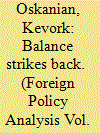

|
|
|
|
|
| Summary/Abstract |
Tbilisi’s recent foreign policy presents analysts working from a balance-of-power perspective with something of a puzzle: with Russia very much the regionally dominant power, against the predictions of structural-systemic theories, small state Georgia has ended up balancing against, rather than bandwagoning with, great power Moscow. As a result, domestic, ideological explanations that implausibly ignore or minimize interstate considerations of power have predominated in analyses of Tbilisi’s foreign policy. In response, this essay examines Georgia’s post-Soviet foreign policies from a neoclassical realist theoretical viewpoint, combining systemic, balance-of-power and domestic ideological factors: throughout the period under review, Tbilisi’s policies were thus due to ideologically conditioned perceptions of shifting power-political realities in its neighborhood, with an ideological adherence to liberal norms playing a particularly important role in distorting these perceptions during the Saakashvili administration. Through this combination of power and ideology, neoclassical realism ends up providing a more comprehensive and continuous account of Tbilisi’s shifting policies since 1992 than either domestic or alternative realist frameworks, like balance-of-threat theory, or omnibalancing; as an important implication, Georgia’s, and other former Soviet states’ continued pro-Western orientation will depend as much on their perceptions of the West’s continued commitment to regional power projection as on domestic ideological preferences.
|
|
|
|
|
|
|
|
|
|
|
|
|
|
|
|
| 4 |
ID:
187474
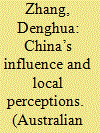

|
|
|
|
|
| Summary/Abstract |
Traditional powers have growing concerns about China’s influence in the Global South derived from its fast-growing outreach in the past two decades. However, how stakeholders in developing countries perceive China’s engagement and influence remains largely unknown. Drawing upon a survey of 210 participants and 30 follow-up interviews in the Pacific region with a focus on Papua New Guinea, Fiji and Tonga, this paper examines Pacific civil society stakeholders’ perceptions about China. It suggests that these perceptions are nuanced at best and reveals concerns about the Belt and Road Initiative, Chinese foreign aid and China-Pacific relations. It argues that China’s influence on Pacific civil society is weak, but this may be different in the political, government and business sectors. More similar research is required to develop a comprehensive understanding.
|
|
|
|
|
|
|
|
|
|
|
|
|
|
|
|
| 5 |
ID:
189256
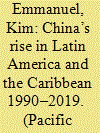

|
|
|
|
|
| Summary/Abstract |
To date, perceptions of China's rise in relation to US hegemony in the international realm has not escaped scholarly scrutiny. For the period 1990–2019, the International Relations literature has made a somewhat copious contribution to the broader debates on the US and China. Within the Sino-Latin America Caribbean (LAC) discourse, the implications of China's ascent for US interests in the region is an underlying concern. The region is considered salient in broader power configurations as a result of its geostrategic positioning in relation to the US. However, perceptions pertaining to the triad of interests in the space account largely for powerful states in the dynamic. Despite the ambiguous perceptions associated with a rising China in the international realm and the Latin America Caribbean region's strategic position, rather than being preoccupied with ideas of the ‘China threat’, these states appear to have largely bypassed the more threatening rhetoric associated with China's rise in the period under scrutiny. In seeking to bring Latin America and Caribbean states into the discourse, the article examines how benign perceptions shaped the region's relationship with China. The argument is made that Latin America and Caribbean states sought to frame and navigate their relationship with China largely on the premise of economic opportunity amidst a firmly embedded US role inside the region which further repudiated ideas of the ‘China threat’ in the engagement. In unpacking the argument, the discussion seeks to show that more favourable images of China's economic ascent punctuated LAC states responses to China and that such states have been driven by a high level of economic pragmatism in the relationship. It also illustrates that the underlying hegemonic order has practical effects and more subtle manifestations inside LAC states which mitigated against perceptions of threat in China's rise in the region.
|
|
|
|
|
|
|
|
|
|
|
|
|
|
|
|
| 6 |
ID:
174222


|
|
|
|
|
| Summary/Abstract |
In South Africa, the smallholding-farming system is a dominant economic activity in rural communities. This study examines smallholder-farmers’ perceptions in regards to climate changes, in comparison with evidence from meteorological data from 1980–2015, across Vhembe District; data from a questionnaire and recorded meteorological were used. The results reveal that, farmers’ perceptions of climatic conditions are consistent with meteorological details on climatic change. In other words, the study, showed that, farmers’ perceptions using climate indicators, mirror meteorological data. It was concluded that it is imperative for farmers to understand issues such as, temperature and rainfall patterns in order to identify adaptive strategies to the negative impacts of climate.
|
|
|
|
|
|
|
|
|
|
|
|
|
|
|
|
| 7 |
ID:
116634
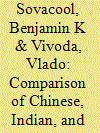

|
|
|
|
|
| Publication |
2012.
|
| Summary/Abstract |
This study explores how Asian energy security issues are perceived in China, India, and Japan. It investigates perceptions of 16 energy security challenges drawn from an extensive survey, as well as how such conceptions differ between Asian energy consumers and across these dimensions of energy security.
|
|
|
|
|
|
|
|
|
|
|
|
|
|
|
|
| 8 |
ID:
187390


|
|
|
|
|
| Summary/Abstract |
Research on postwar peace focuses primarily on how elites and institutions can prevent relapse into civil war. In line with this special issue’s focus on citizens’ experiences, we take a micro-level approach to explore peace beyond the absence of war. We investigate how members of opposing sides experience peace a decade after a decisive victory of the majority. Using original survey data from a representative sample of 2000 respondents in 2018 Sri Lanka, we find that even one decade after the conflict members of the Sinhalese winning majority are consistently more likely to report improvements in peace than Tamils, who were represented by the defeated minority. But the benefit of a “victor’s peace” does not seem to translate into an optimistic outlook of the victorious group, nor does it increase people’s endorsement for repressive state measures. Despite the drastically improved physical security for the defeated ethnic minority since the war, they experience a deterioration in other dimensions of peace. Our findings have important implications for a deeper understanding of variations in peace and reconciliation processes.
|
|
|
|
|
|
|
|
|
|
|
|
|
|
|
|
| 9 |
ID:
185958


|
|
|
|
|
| Summary/Abstract |
The qualitative study described in this paper aims to explore perceptions and challenges associated with a bi-ethnic identity in a multi-ethnic country. Sample of this study was recruited by snowball sampling technique. Semi-structured, in-depth interviews were conducted with fifteen Chindian adolescents. Results yielded a number of themes related to the perceptions of being a Chindian (i.e., enjoy the best of both worlds, peer acceptance, and sense of pride) as well as challenges (i.e., phenotype ambiguity, social insensitivity, situational ethnicity, and identity crisis). More research is required to identify ways to overcome challenges associated with bi-ethnic identity and to examine how these challenges would affect identity formation.
|
|
|
|
|
|
|
|
|
|
|
|
|
|
|
|
| 10 |
ID:
103177


|
|
|
|
|
| Publication |
2011.
|
| Summary/Abstract |
This paper introduces a brief framework on the political decision-making process in the context of terrorism. I relate the trade-offs policy-makers are faced with to the economic terrorism literature. Past years have shown a steady increase in theoretical and empirical contributions. However, the major part of the empirical advances is on the economic effects of terrorism, its origins, and drivers. More analysis is needed on public perceptions, responses to both the threat of terrorism and policy measures, as well as the costs of anti-terrorism measures. This would improve our understanding of the impact of terrorism on political and economic development.
|
|
|
|
|
|
|
|
|
|
|
|
|
|
|
|
| 11 |
ID:
095020
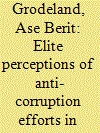

|
|
|
|
|
| Publication |
2010.
|
| Summary/Abstract |
Anti-corruption efforts introduced in Ukraine in recent years have predominantly been imposed from the outside. They have been vague, all-inclusive and lacking in political and public support. What is more, they have been fairly insensitive to the cultural context into which they have been introduced. While targeting corrupt behaviour, they have largely ignored its root causes. The impact of Ukrainian anti-corruption reform has therefore been limited. Drawing on extensive qualitative data from Ukraine, this article explores elite (i) perceptions of Ukrainian anti-corruption reform, (ii) familiarity with specific anti-corruption initiatives, and (iii) views on how best to combat corruption. Not surprisingly, Ukrainian elites are familiar with, and fairly negative in their assessment of, national anti-corruption reform. They advocate a number of measures targeting corrupt behaviour as well as its root causes with a view to reducing corruption in Ukraine".
|
|
|
|
|
|
|
|
|
|
|
|
|
|
|
|
| 12 |
ID:
100927
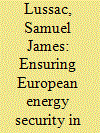

|
|
|
|
|
| Publication |
2010.
|
| Summary/Abstract |
Why has the European Union been so little involved in South Caucasian pipeline politics in the last two decades? Deconstructing the European Union (EU) around the Caspian hydrocarbons transportation network, this article tries to demonstrate how European beliefs toward Russia prevented further EU involvement in the South Caucasus. Until the 2006 Russian-Ukrainian gas crisis, most of the European actors gave more importance to the EU-Russian partnership than to the relations with the South Caucasian states. But the rising concerns over Russia as a reliable energy partner have led to a reconfiguration of the European exchanges with the South Caucasus. Since 2006, the energy cooperation between the EU and Azerbaijan and Georgia has considerably increased, to such an extent that the former is about to become a central component of the Caspian hydrocarbons transportation network. Despite the division among member states and inside the European Commission, this increasing cooperation is especially vivid regarding the implementation of the Southern Gas Corridor. The decrease of confidence between Russia and the EU has thus paved the way for further involvement in pipeline politics in the South Caucasus, leading to a new definition of European energy security in Russian 'Near Abroad'.
|
|
|
|
|
|
|
|
|
|
|
|
|
|
|
|
| 13 |
ID:
166517
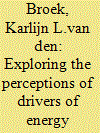

|
|
|
|
|
| Summary/Abstract |
Many models have been applied to predict energy use and savings, yet few studies have investigated people's own perceptions of what drives their energy use. Understanding these perceptions can help design energy policy that is likely to be trusted and perceived as credible. This study assessed the perception of the drivers of energy use among young adults, who had recently become independent energy consumers, but were not yet paying for their energy bills. Focus groups were conducted in which the drivers of energy use were discussed, and discussions were analysed using a framework of a successful existing behavioural model – the Comprehensive Action Determination Model – that includes both conscious and unconscious drivers of energy consumption. The findings show (1) participants did not tend to believe they saved energy to conserve the environment, (2) adherence to egoistic values, apparent in the lack of motivation to save energy in the absence of financial incentives, and (3) strong awareness of energy habits. Policy makers targeting young adults' energy use are advised how to align energy policy with these perceptions.
|
|
|
|
|
|
|
|
|
|
|
|
|
|
|
|
| 14 |
ID:
192159


|
|
|
|
|
| Summary/Abstract |
Interest and anxiety about China’s economic statecraft, or the ways in which it uses economic means to achieve foreign policy, is booming. The overriding perception is that China has sophisticated, long-term plans to enhance its power on the global stage through the use of economic strategies and tools and that it is uniquely capable of effectively implementing those plans now or in the future. Yet when it comes to actual outcomes, whether or not China has been able to achieve its foreign policy goals via economic means, the evidence is mixed at best. This article seeks to move beyond some of the shortcomings in our understanding of Chinese economic statecraft by exploring the links between perceptions, ambitions, abilities, and outcomes of Chinese foreign economic policies and behaviour. We propose an alternative to the concept of economic statecraft by introducing instead five different ‘modes of economic influence’. We suggest directions for future research focused on China’s economic influence, including its latent structural power.
|
|
|
|
|
|
|
|
|
|
|
|
|
|
|
|
| 15 |
ID:
179677


|
|
|
|
|
| Summary/Abstract |
Fuel subsidies in Nigeria are enormous – around USD 3.9 billion – almost double the health budget. Such subsidies come at great cost: the opportunity costs of such spending on other development objectives are large; the distribution of resources to the state governments is reduced; the vast majority of the subsidy goes to better off Nigerians; and cheaper petrol encourages greater pollution, congestion and climate change. Despite this, most Nigerians oppose the reduction of subsidies. We draw on a new nationally representative household survey that asked Nigerian men and women about their knowledge and attitudes towards subsidies. We construct and test a set of hypotheses about the factors associated with support for subsidy reform. We find that those who pay more or who experience less availability of fuel tend to support reform more. On the other hand, people who believe the Government is corrupt or lacks the capacity to implement compensation programs appear strongly opposed to reform. Finally, being religious and the delivery of reasonable national and local services also improves the acceptance of reform. These results support the idea that building a social contract is key to reform success.
|
|
|
|
|
|
|
|
|
|
|
|
|
|
|
|
| 16 |
ID:
147817
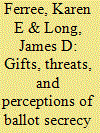

|
|
|
|
|
| Summary/Abstract |
Are contingent electoral strategies, like vote buying and intimidation, effective in Africa? No, according to recent scholarship: unlike parties in other developing regions like Latin America, African parties lack the capacity to violate ballot secrecy and force voters to stick to their end of the bargain. Voters can therefore “defect” and vote their conscience. We challenge this perspective. Recent Afrobarometer data show that nearly one in four Africans doubt ballot secrecy. We argue that the perception of ballot secrecy violation is sufficient for enabling contingent strategies. Drawing upon Afrobarometer data and an original exit poll conducted during the 2008 Ghanaian election, we show that doubts about ballot secrecy correlate with vote buying, intimidation efforts, and measures of campaign intensity, suggesting that they are a deliberate product of party efforts. Pervasive doubts about ballot secrecy challenge the notion that African parties are too weak to implement contingent electoral strategies. African parties can and do convince voters that their vote choices are known, particularly in urban areas where party capacity and community accessibility are highest. Doubts about ballot secrecy enable both vote buying and voter intimidation strategies, and suggest that formal rules enshrining the secret ballot offer insufficient protection to African voters.
|
|
|
|
|
|
|
|
|
|
|
|
|
|
|
|
| 17 |
ID:
165151
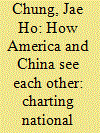

|
|
|
|
|
| Summary/Abstract |
Based on the premise that perception operates either as a catalyst or a constraint for a hegemonic war, this study examines ‘national perceptions’ (i.e. how the citizens of the two states view each other) and ‘official views’ (i.e. how the two governments perceive each other) between the US and China of the post-Cold War period. As for the national views, (1) American perceptions of China have generally become more negative than Chinese perceptions of America; (2) little congruence is found between the two powers on key values and norms; and (3) perceptions are generally getting far ahead of the realities. As for the official views, formal documents do not fully reveal their real state of minds. Diplomatic courtesy and strategic self-esteem runs through them. Yet, America’s strategic concern and growing will to manage China from a position of strength is increasingly more discernible. From the Chinese documents, on the other hand, signs of inferiority have gradually disappeared. In sum, perceptions between the two are working more as a catalyst for strategic competition than a constraint on it.
|
|
|
|
|
|
|
|
|
|
|
|
|
|
|
|
| 18 |
ID:
178262


|
|
|
|
|
| Summary/Abstract |
Drought is a major challenge threatening agricultural productivity in uMsinga. The occurrence of drought is expected to increase in coming decades, intensifying in severity, duration and the way people are affected by drought. The objective of this study is to understand small-scale farmers’ and rural communities’ perceptions of drought, its environmental and socio-economic impacts, adaptive and mitigation measures at household level and their satisfaction with the government’s role in drought management in the community. The study utilized a combination of quantitative and qualitative research methods, in the form of questionnaires, focus groups and key informant interviews. The sample size for the research study was 180 respondents for the questionnaire component and a total of 30 respondents for the focus groups and key informant interviews. The results show that increased levels of poverty, food insecurity and increased migration were the main socio-economic impacts perceived by respondents. Water scarcity, crop failure, forest degradation and an increase in average temperatures were perceived by respondents as the main environmental impacts caused by drought in uMsinga. Respondents perceived drought as a serious threat to agricultural production and adopted various indigenous adaptive strategies. A majority of respondents adopted a reactive approach to drought management, and therefore did not adopt many mitigation measures.
|
|
|
|
|
|
|
|
|
|
|
|
|
|
|
|
| 19 |
ID:
184653


|
|
|
|
|
| Summary/Abstract |
This article investigates the stark variation in elite appraisals of the performance of the International Criminal Court (ICC). Based on an online survey of diplomats posted to the UN headquarters, this article determines which country situations under ICC scrutiny respondents regard as successes or failures and, in turn, what parameters underpin their views. It also asks about negative cases; that is, country situations that never made it to The Hague due to political considerations. This article makes a two-fold contribution to the study of international law and politics. First, it shows that diplomats conceptualize international justice in terms of ongoing prosecutions and convictions obtained. Thus, they downplay indirect effects such as positive complementarity. Interestingly, scholars and diplomats agree on the court’s fiascos, yet dissent on successes. Finally, diplomats have proved tired of political considerations obstructing international justice. Survey data reveals that they want the court to investigate situations involving major powers.
|
|
|
|
|
|
|
|
|
|
|
|
|
|
|
|
| 20 |
ID:
177346
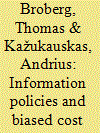

|
|
|
|
|
| Summary/Abstract |
Households typically receive utility bills where all electricity use during a fixed period is lumped together. The lack of direct feedback in the form of marginal costs of using specific electric appliances potentially leads to mistakes in households' decision-making because of biased cost perceptions. In this paper, we test the commonly held notion that lack of relevant energy-related knowledge results in cost underestimation of using electric appliances that may lead to over-consumption of energy. Contrary to this notion, our results show that less knowledgeable energy consumers tend to have higher cost perceptions than others. This finding implies that less knowledgeable energy consumers may consume too little of energy. We also find that a substantial share of the sampled households, in particular less knowledgeable energy consumers, are less willing to receive relevant cost-free information about their energy use and costs. This finding suggests that poor energy-related knowledge may not only be a matter of high information search and processing costs, but also a matter of consumers’ limited attention capacity.
|
|
|
|
|
|
|
|
|
|
|
|
|
|
|
|
|
|
|
|
|